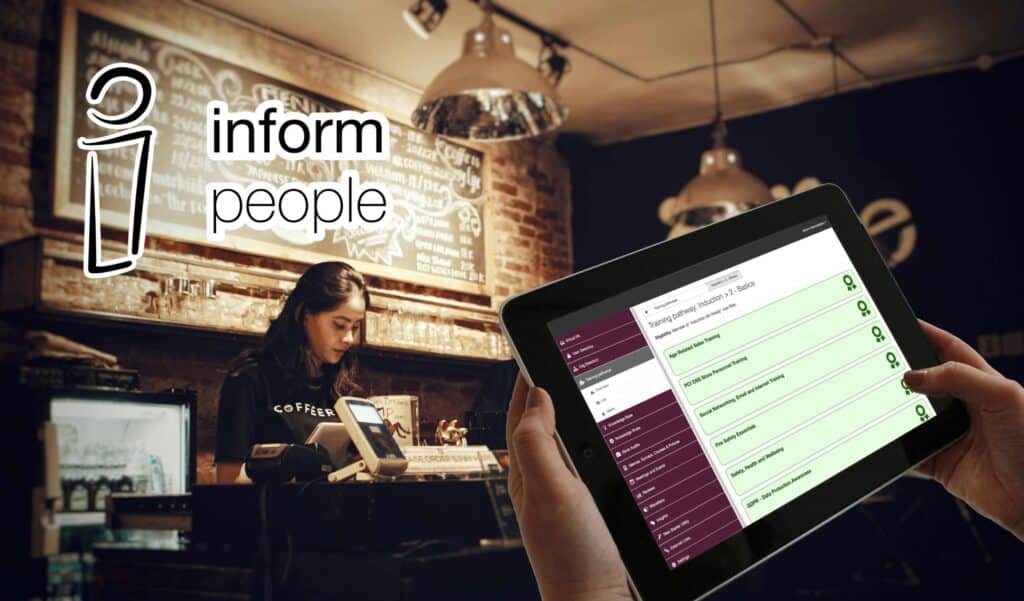Focused, Efficient, and Cost-Effective
Retail and hospitality workplaces can be extremely fast-paced. From your employees’ very first shift, you want your new starters to be up to speed as quickly as possible and out on the floor doing their job.
Training and development need to be as agile and efficient as the industries themselves. Outdated, lengthy, and overly broad training programs waste time, money, and resources while often failing to engage employees. Trouble arises too when new approaches are also overly complicated, flashy and more about entertainment than the core competency and compliance they are trying to communicate. Instead, learning initiatives should be streamlined, precise, and targeted at the right people for the right reasons; in-person training should be specific and short, and online learning should be simple and effective.
Here’s why, and how, we think that Inform People’s online compliance and performance management software can support organisations to make this shift.
Learning for the Right People at the Right Time
Not every employee needs every piece of training – especially on their start day. Your first, and most effective step towards efficient training, is to look at every piece of learning and the policies that are required for a safe start and prioritise these. Other relevant pieces can be staggered into an induction programme that can be undertaken over time. There will also still be a significant amount of ‘on the job’ learning required with demonstrations and examples from existing team members, so you should also make sure that trainers or managers have a structured digital way to log all progress towards onboarding activities, ensuring training programmes are equivalent nationally.
We suggest that these journeys can be made as straightforward as possible with the implementation of Pathways – where each task is tracked with a digital footprint with Management approval at the relevant stages.
Anything that goes beyond the ‘day-to-day’ and initial health and safety essentials should be optional. These should include any learning opportunities that are tailored towards career development or special interests. Rather than forcing the same generic training on everyone, tailor it to job roles and ambitions. By offering opt-in development pathways, employees who are invested in their growth can engage meaningfully, while others can focus on mastering their core roles.
Performance Reviews as a Training Gateway
During the completion of Performance Reviews, you have the perfect opportunity to check in with the whole company about what training is desired, providing insight for L&D teams to review what is currently available and how to best make available any additional training opportunities.
Rather than seeing review periods as a ‘box ticking’ exercise, you can use them to really pinpoint your workforce’s goals and aspirations and plan your development training opportunities with requests in mind. Not only will you be able to get a clearer picture of how the company is performing against business competencies and values, you can start to concentrate on lean learning initiatives. This could result in the development of new online learning courses or in-person training events that reflect the requirements of your most invested and high-flying employees – ready to take their next steps up through advancement opportunities.
This approach enables managers to unlock relevant training options that align with each individual’s aspirations, making development more personalised and impactful.
Role-Focused Learning: No More Unnecessary Training
Each role within a company has specific learning requirements; there’s no need for a cashier to sit through kitchen-specific training if it isn’t relevant to their actual day-to-day role. Training should be customised to fit job functions, ensuring employees receive only what’s relevant to their roles.
While cutting down on unnecessary training, it’s still crucial to ensure essential topics, like fire safety, are covered appropriately. However, these should be tailored to specific locations rather than generic, lengthy online courses that waste valuable time. Training should be brief, specific, and immediately applicable.
While we are on the topic of targeting content, Policies and Risk Assessments should be considered in the same way – you can use your Organisational Structure to make sure that only venues with an Escalator or Lift get any training or sign-off on those features. This also applies to companies where Head Office, Venues and Depots require different targeting training. Using Inform People’s platform with detailed permissions settings, your people will get exactly the training they need, based on their job title and location, from the moment they are added to the platform.
Similarly, having training set up in role-related Pathways allows for near instant flexibility to assign not just single courses but a whole series of related learning and responsibilities when sudden cover is required. For example, a trusted Supervisor is asked to step into a cover Manager role at short notice and can be assigned all their digital training in one click through their Virtual PA.
Lean, Retention-Focused Training Saves Money
High turnover is a costly issue in any industry. Instead of blanket advanced training for all, prioritise development for those who are committed to staying. Investing in engaged employees ensures a better return on training costs and improves long-term workforce stability.
Standard training should be focused on safety and role-specific skills with more time-consuming and therefore costly modules reserved for employees who demonstrate reliability and engagement. Though those responsible for training should make sure to broadcast these opportunities and not silo them behind management initiatives. You never know who is seeking advancement until you offer it.
Smarter Training For Overall Improvements
Retail and hospitality businesses must move away from inefficient, one-size-fits-all training programs. By focusing on role-specific, opt-in, and retention-focused learning, organisations can save time and money while fostering a more engaged workforce. A streamlined approach benefits employees and businesses alike. By adopting a lean, retention-focused training model, companies can cut unnecessary costs while building a dedicated, highly skilled workforce. When training is relevant, efficient, and meaningful, everyone wins.
Does this seem like an approach you would like to investigate further? Get in touch via your method of choice here.




